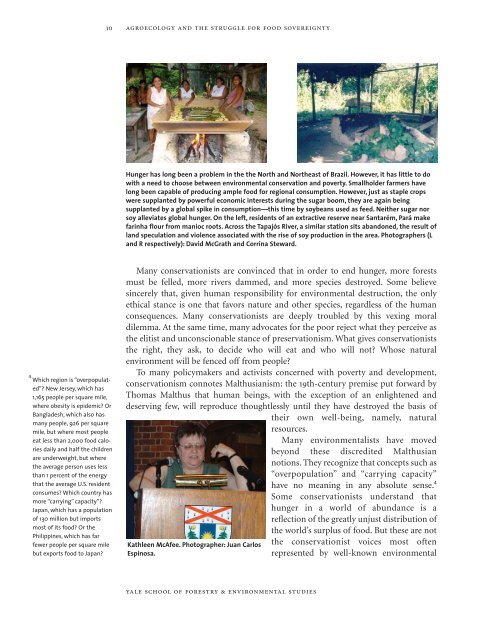Agroecology and the Struggle for Food Sovereignty ... - Yale University
Agroecology and the Struggle for Food Sovereignty ... - Yale University
Agroecology and the Struggle for Food Sovereignty ... - Yale University
You also want an ePaper? Increase the reach of your titles
YUMPU automatically turns print PDFs into web optimized ePapers that Google loves.
10<br />
agroecology <strong>and</strong> <strong>the</strong> struggle <strong>for</strong> food sovereignty<br />
Hunger has long been a problem in <strong>the</strong> <strong>the</strong> North <strong>and</strong> Nor<strong>the</strong>ast of Brazil. However, it has little to do<br />
with a need to choose between environmental conservation <strong>and</strong> poverty. Smallholder farmers have<br />
long been capable of producing ample food <strong>for</strong> regional consumption. However, just as staple crops<br />
were supplanted by powerful economic interests during <strong>the</strong> sugar boom, <strong>the</strong>y are again being<br />
supplanted by a global spike in consumption—this time by soybeans used as feed. Nei<strong>the</strong>r sugar nor<br />
soy alleviates global hunger. On <strong>the</strong> left, residents of an extractive reserve near Santarém, Pará make<br />
farinha flour from manioc roots. Across <strong>the</strong> Tapajós River, a similar station sits ab<strong>and</strong>oned, <strong>the</strong> result of<br />
l<strong>and</strong> speculation <strong>and</strong> violence associated with <strong>the</strong> rise of soy production in <strong>the</strong> area. Photographers (L<br />
<strong>and</strong> R respectively): David McGrath <strong>and</strong> Corrina Steward.<br />
4 Which region is “overpopulated”?<br />
New Jersey, which has<br />
1,165 people per square mile,<br />
where obesity is epidemic? Or<br />
Bangladesh, which also has<br />
many people, 926 per square<br />
mile, but where most people<br />
eat less than 2,000 food calories<br />
daily <strong>and</strong> half <strong>the</strong> children<br />
are underweight, but where<br />
<strong>the</strong> average person uses less<br />
than 1 percent of <strong>the</strong> energy<br />
that <strong>the</strong> average U.S. resident<br />
consumes? Which country has<br />
more “carrying” capacity”?<br />
Japan, which has a population<br />
of 130 million but imports<br />
most of its food? Or <strong>the</strong><br />
Philippines, which has far<br />
fewer people per square mile<br />
but exports food to Japan?<br />
Many conservationists are convinced that in order to end hunger, more <strong>for</strong>ests<br />
must be felled, more rivers dammed, <strong>and</strong> more species destroyed. Some believe<br />
sincerely that, given human responsibility <strong>for</strong> environmental destruction, <strong>the</strong> only<br />
ethical stance is one that favors nature <strong>and</strong> o<strong>the</strong>r species, regardless of <strong>the</strong> human<br />
consequences. Many conservationists are deeply troubled by this vexing moral<br />
dilemma. At <strong>the</strong> same time, many advocates <strong>for</strong> <strong>the</strong> poor reject what <strong>the</strong>y perceive as<br />
<strong>the</strong> elitist <strong>and</strong> unconscionable stance of preservationism. What gives conservationists<br />
<strong>the</strong> right, <strong>the</strong>y ask, to decide who will eat <strong>and</strong> who will not? Whose natural<br />
environment will be fenced off from people?<br />
To many policymakers <strong>and</strong> activists concerned with poverty <strong>and</strong> development,<br />
conservationism connotes Malthusianism: <strong>the</strong> 19th-century premise put <strong>for</strong>ward by<br />
Thomas Malthus that human beings, with <strong>the</strong> exception of an enlightened <strong>and</strong><br />
deserving few, will reproduce thoughtlessly until <strong>the</strong>y have destroyed <strong>the</strong> basis of<br />
<strong>the</strong>ir own well-being, namely, natural<br />
resources.<br />
Many environmentalists have moved<br />
beyond <strong>the</strong>se discredited Malthusian<br />
notions. They recognize that concepts such as<br />
“overpopulation” <strong>and</strong> “carrying capacity”<br />
have no meaning in any absolute sense. 4<br />
Some conservationists underst<strong>and</strong> that<br />
Kathleen McAfee. Photographer: Juan Carlos<br />
Espinosa.<br />
hunger in a world of abundance is a<br />
reflection of <strong>the</strong> greatly unjust distribution of<br />
<strong>the</strong> world’s surplus of food. But <strong>the</strong>se are not<br />
<strong>the</strong> conservationist voices most often<br />
represented by well-known environmental<br />
yale school of <strong>for</strong>estry & environmental studies

















